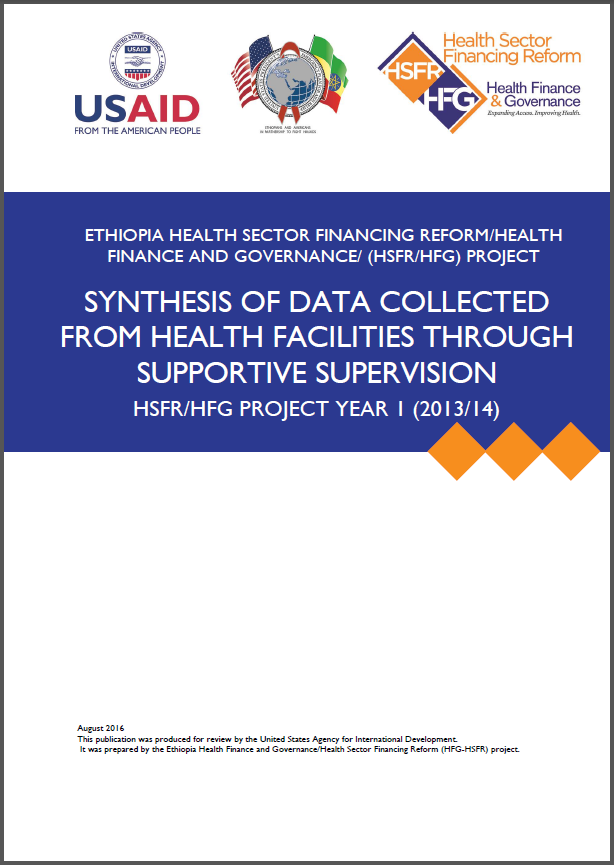Synthesis of Data Collected From Health Facilities through Supportive Supervision – HSFR/HFG Project Year 1 (2013/14)
Categories: Health Finance, Home Page Map, Publications, Where We Work
Resource Type: Report
Authors: Ethiopia Health Sector Financing Reform/Health Finance and Governance Project
Published: August 2016
Resource Description:
The Ethiopian government has introduced a wide range of health care financing (HCF) reforms aimed at increasing the availability of resources for health and thereby protecting the population from catastrophic spending at time of sickness. These reforms include allowing health facilities autonomy to establish facility governance structures, retain and use resources generated at the facility level to improve the quality of health services, improve protection of the poor through a fee waiver system, and provide certain exempted services that are in effect public goods. They also allow public hospitals to establish private wings and outsource non-clinical services. These reforms were first implemented in Amhara, Oromia, and Southern Nations, Nationalities and Peoples (SNNP) regions and then expanded to all other regions and the country’s two city administrations (Dire Dawa and Addis Ababa). Supportive supervision is used by HSFR/HFG to monitor the performance of health facilities in implementing these reforms; supervisors use a standard checklist developed under the project to review and offer feedback on facility progress.
This report synthesizes data collected from supportive supervision monitoring visits conducted under HSFR/HFG between August 1, 2013 and June 30, 2014 (HSFR/HFG Project Year 1 and Ethiopian Fiscal Year 2006), and presents key findings and recommendations. Project staff conducted supportive supervision visits at 549 health facilities (25 hospitals and 524 health centers (HCs)) in Afar, Amhara, Benishangul-Gumuz, Gambella, Harari, Oromia, SNNP, and Tigray regions, and Addis Ababa and Dire Dawa city administrations. Though there are variations among facilities and regions, findings indicate that: most of the facilities visited had the required management, finance, and administrative staff in place to implement HCF reforms; health facility finance staff had at least a diploma level of education; and half had received in-service training on HCF reform implementation and financial management. However, 88.0 percent of hospitals and 57.4 percent of HCs encountered staff turnover for various reasons, which resulted in skill and knowledge gaps in their financial management. In addition, 96.5 percent of facilities had established facility governing boards/bodies, and board/body members had received training on facility governance.
Download



